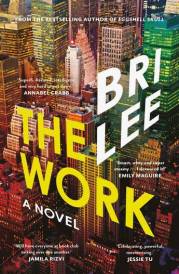Virginie Efira Up For Love Interview
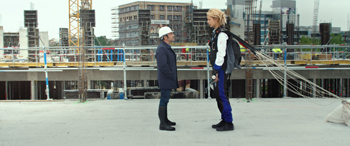
Virginie Efira Up For Love Interview
Cast: Jean Dujardin, Virginie Efira, Cédric Kahn
Director: Laurent Tirard
Genre: Comedy, Romance
Running Time: 98 minutes
Synopsis: Jean Dujardin stars in this French, romantic, laugh-out-loud-comedy that is all about the long and short of falling in love.
When successful lawyer, Diane (Virginie Efira) gets a call from the man who has found her mobile phone, she is immediately intrigued and charmed. As she and Alexandre (Dujardin) chat and make plans to meet, it becomes evident that the chemistry between them is great indeed. However, when they meet the next day it turns out there may be one small problem.
New relationships are always awkward and for Diane & Alexandre the challenges in their relationship could be somewhat of a tall order. Despite his charisma and good looks, Alexandre comes up a bit short (almost 2 feet, actually). Is Diane out of his reach or can they meet in the middle?
They're both looking for love but society is watching and judging. A perfect match in every way but one, will this new couple be up for the challenge? Will they be Up For Love?
Up For Love
Release Date: December 1st, 2016
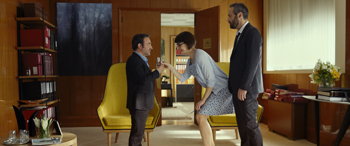 Interview with Virginie Efira
Interview with Virginie Efira
Question: What attracted you to this project?
Virginie Efira: Even before they offered it to me, I had heard some talk about the project, and it intrigued me quite a lot. I thought that the idea of a woman who fantasizes about a man she doesn't know, before discovering that he measures 4 foot 7, and who finds herself torn between love and a kind of social embarrassment, was an excellent subject for comedy. And truly original. And the fact that Laurent Tirard would be directing, and a shrunken Jean Dujardin playing the character, made the project all the more exciting and special. I knew Laurent Tirard and his work, so I knew that he had taste and high standards, whether as regards form or content… and Jean Dujardin, because I always thought that he played with a crazy kind of freedom. So I went in for an audition, and we started out together. I met the producer. It was her first production. She was unusually enthusiastic, and that was infectious. I think that she had a lot to do with the energy on this shoot. And then of course, there was the screenplay by Laurent Tirard and Grégoire Vigneron, who were able to preserve a kind of narrative simplicity, without sacrificing the complexity of the characters, even if it is a comedy. The subject is funny, but at the same time I find the issue of the very intimate view we have of each other, and the view society has of us, very universal and interesting. When are we really free in the choices we make? Does the way others look at us influence our own feelings?
Question: How did you approach the character of Diane?
Virginie Efira: I didn't watch the original film because it would have limited my acting to a particular style. To do something new, I needed to let my imagination run wild, to forget about moral values, to understand this woman with her good points and her flaws. I had to forget about archetypes of the strong female, to give Diane a human consistency. For that, I worked a lot on the text and each time I didn't understand one of her reactions, I looked for a way of putting some of myself into it to own the situation totally. My main challenge was to bring a kind of truth to a rather strange postulate, while still respecting the comedy. To believe it, you have to dig deep into the situation and transmute your character into a person of flesh, and blood, and soul.
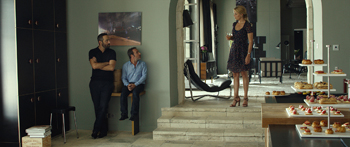 Question: What was it like, working with Jean Dujardin?
Question: What was it like, working with Jean Dujardin? Virginie Efira: I don't know if it's because we knew each other a little before, but we very soon felt wonderfully complicit. I must say that Jean is very elegant, and he doesn't rank human relations hierarchically. Because in so many ways he still remains childlike, he likes to try out new things, and that helps you to feel free and easy very quickly. In spite of all that, you always need a little time to understand how your partner works. Especially for this film, in which the fundamental elements were so particular: what I saw was not necessarily what you were going to see in the film. I mean especially those green backgrounds which we are not so used to in France, or scenes in which we are standing, but cannot look each other in the eye. I stared at one of his shirt buttons, and he stared at a cloud over my head when he talked to me. When we played in the street, it was absurd: passersby must have thought we were doing contemporary street art!
Question: Did you feel, when reading the screenplay, that the film would be so romantic?
Virginie Efira: No, because a film is always the result of what you do together. But I could tell that it was a possibility. And for me to like the project, it had to have that aspect. Laurent quickly put us at ease: if we didn't feel right with some lines, we could suggest something else. In this kind of big film, I wouldn't say you have to make things more muddled, but you need to prevent things from becoming mechanical: respecting nuances, following the other person's eyes to give consistency to your exchanges. Afterwards, the charm works or it doesn't: it's not something that you can control.
Question: What kind of director is Laurent Tirard?
Virginie Efira: He's not the kind of angst-ridden cineaste who drowns you in information or questions. Laurent is stingy with words, and when he says something to you, it's never in vain. That feeds your confidence enormously. But it's good to have different ways of functioning, because that is what prevents actors from creating a method and limiting themselves to it. Sometimes I need to understand something, sometimes not. Then I just need to remain in sync with all the various elements. I always try to avoid comfort zones: when everything is working in a film, you need to create some tiny imperfections.
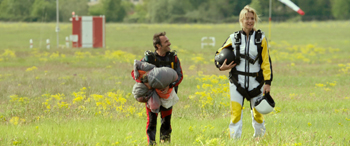 Question: Do you like to improvise?
Question: Do you like to improvise? Virginie Efira: I don't much believe in improvisation. Actors can end up listening to themselves speak, and I don't like actors taking over on set. What's nice is to improvise in a framework. At times that reveals a sub-text. In the dinner scene, for example, Laurent left us very free. I didn't feel very comfortable with the funny stories they were telling. Personally I hate jokes, and we went to town with them in that scene. The same goes for the breakup scenes, for which Laurent accepted suggestions before shooting, so that the actors would feel as close as possible to what they were playing. I also like Jean's reserve a lot. He always maintained a kind of dignity for his character. In emotional scenes, he never goes overboard, and that also influences what you may suggest.
Question: You have a real feel for comedy. Do you know where it comes from?
Virginie Efira: No, I don't quite know where it can come from, but I don't really think I have much of a comic nature. I'm not Valerie Lemercier or Jacqueline Maillant, even if I wish I were. I asked my mother if I was funny when I was a little girl. She thought it over for 15 seconds, and just said ... No. That was a laugh. But there is something absurd about taking everything so seriously, when we know how we're all going to end up... And so humor, wit seems to be the only defense that works! I don't know how to get along with people who have no sense of humor, and in the movies, I have a real love for comedy. Comedies that manage to blend lightness and depth. That's the supreme elegance!
Question: What do you like about the romantic comedy genre?
Virginie Efira: I like people in movement, who change, who look for life, or at least, the élan vital. At the movies, the easiest, and perhaps most beautiful way of showing that is by two people meeting and falling in love. It makes you topple over into the other person's codes, it enlarges your perception of the world, and it also weakens you. It's exciting to play... Especially since in real life you can't experience that 1000 times, otherwise it no longer has any meaning! There was something I liked about Diane's late emancipation. And I also like to subvert apple pie and motherhood. Loving someone who is different isn't easy. Freeing yourself of prescriptive norms is not self-evident for everyone. I like the shame she can feel, the shame we may feel for her, and then the shame of even having had such a thought. I like all the things it makes her go through.
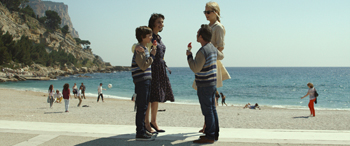 Question: What did this character Diane teach you about yourself?
Question: What did this character Diane teach you about yourself? Virginie Efira: A character always teaches you something about yourself. In an approach which is not intellectual, but sensitive. There is something a little cut-and-dried about Diane at the beginning of the film, she feels cramped in her existence and doesn't know how to open things up. As if she wanted others' approval before acting. That kind of submission rings a bell with me. It reminds me of things I've gone through and which I obviously used. Trying to break free is not easy, I'm not even sure anyone ever really succeeds, but it can't hurt to try.
Question: What did you think when you saw the film?
Virginie Efira: That it had a tone, a rhythm, and a truth. I thought my partners were in tune, and moving. And it was fun to see the film with all the special effects. On set, we had an idea of what it would look like, but because the reductions were not always definitive, I was afraid that Jean would come out looking like a Tolkien character. Luckily, he looks a lot more real than that!
Up For Love
Release Date: December 1st, 2016
MORE
- Mission: Impossible Fallout
- Glenn Close The Wife
- Allison Chhorn Stanley's Mouth Interview
- Benicio Del Toro Sicario: Day of the Soldado
- Dame Judi Dench Tea With The Dames
- Sandra Bullock Ocean's 8
- Chris Pratt Jurassic World: Fallen Kingdom
- Claudia Sangiorgi Dalimore and Michelle Grace...
- Rachel McAdams Disobedience Interview
- Sebastián Lelio and Alessandro Nivola...
- Perri Cummings Trench Interview



